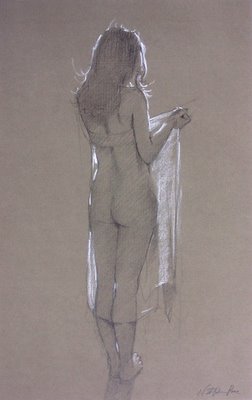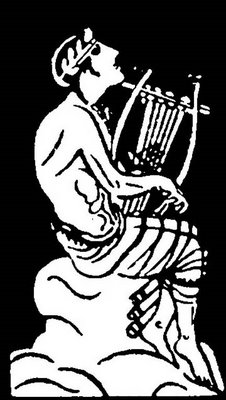Earish Harp Solo

So I think (here, out loud, in the desire of making an interior dialogue known to its exterior) that I’ve been making music for a long time with an Other who resides in the sounds inside my words, on that distant shore of grammar where my Beloved is the object of my every desire.
And that desire is pleasurable through its infinite requitals, an ache arcing up and out toward every bourne which separates me from the unio that I dream, burning for lips I know desires mine with an intensity which defies and defines my own.
Am I alone in this soliloquy with the word’s beloved muse? Is our culture so shattered that the individual’s a shrinking island in silent seas? Has the word become so specialized, mandarin, alien, marketed, deconstructed and spun that it can’t say anything anymore?
Is this just a guy thing, or are guy things universal? Lacan suggests that there is only one psychic truth in human beings: man’s desire is the desire of the Other; and that, even for a woman, the only legitimate function is “an abstract, heroic, unique phallus devoted to the service of a lady.” Ladies, whaddaya think of that? Are we all heroes rogering the courtly fields of language, plunging our jousting-pens deep in the hearts of all that keeps us from our joy, or our beloved’s joy? Innie or outie in the sexual expression, are we all trying to say the same thing? Freud and his proponents have been roundly cursed for years now for such assertions, as if what they were trying to name in the unconscious was literally just a neurotic phallocentric man’s attempt to analyze hysteric wymyn. Though their notions have been fully deconstructed, still a dark voice still cries Yes; and More ...
There’s a new book out called The Female Brain by a woman specializing in neuro-psychology or -pharmacology or -physics, some brain specialization. In it she asserts that the way the female-gendered brain is structured is different from a man; the female brain specializes in relationships where men’s brain’s order and control. Men are fascinated with sports scores and scoring in the back seats of cars; women are fascinated with quality rather than quantity, with the intricate inner networks of family.
I played that notion against a story on the PBS Lehrer News Hour last night that looked at the increased number of head injuries sustained by US troops in Iraq. (Though the military’s count of head wounds numbers around 1,500, a specialist in brain trauma says the actual count may be three or five times that, with many not even knowing they suffer brain trauma. The military is growing concerned about troops over there who were not directly injured in a blast but may have caught the shockwaves of two or three roadside bombs and are worried they may be increasingly unfit for duty.)
Anyway, they looked in depth at a man and a woman who had both suffered brain trauma so badly that their memory function had been largely destroyed. The woman had been taught in rehab all manner of keeping her memories alive, by writing down everything she did each day so she could recall them the next, and looking a photos of her family and friends. If she went more than two weeks without looking at those photos, she was in danger of forgetting those people. She knew she had a 2-year-old daughter but had no recollection of giving birth or nursing. Her biggest tragedy was that she could forget those essential relations, which were so much a part of her identity.
For the man, his identity was tied up more in WHAT he knew, rather than WHO: the data of how to do things, what he owned, what he had learned. His acute sense of loss was that those things had spilled out his head wound and left him empty of the things he knew. The things: the many colors bras come in as they slide off the world’s vast breasts; the horsepowers of Chevys and Fords; the whiskeys and bourbons which fire a night; the maps not read, the roads not taken.
Do love and knowledge share some cortical stem? Does my wild need for saying stem from what I know of what I don’t about love? Are my memories housed in a blue vault knowable only to me, sayable only by me? Is everything outside that vault a space indifferent to my screams? When I am shut up at last, who disappears into my silence? Is this only meant for ears inside my own? When I write do I speak for myself, or her, or her in me, or me in her, or me in you, or you for me? Are these questions which you are as indifferent to as species are toward each other?
So I ponder, thus I dream ...

ME AND YOU
It’s always been the two of
us, me and you, the swimmer
in his And of longing, plunged
in that blue dream which tides
beneath a life. You’ve been there
from the moment I awakened.
in the mobile of my first
memories, you were a spear
of sunlight creeping across
a dark floor, piercing me
where my fingers touched.
You were the womb inside
my mother’s voice, milky,
soft, and so plush as to
pillow my own words in
lush vaginas of pure wash
—proferred to me from you.
Those pretty girls walking
by the front window smiling
as if they knew the insides
of my name, the sky all
afternoon sailing sketches
of your face, Roy Rogers
riding Trigger across
great miles coming
home to Dale: -- the
ache I felt for you
everywhere made me
come to love the out-
of-reach in all, that
that beach on which
you sing so high and mistrally
inside a surf not here
but surely near,
welcoming me ashore
abed to a home
I’ll never find in this
world, though surely
you’re no trace it
with the borders of my skin.
I believe this now so deep
and widely that I see
my work here is full yours,
one sure trope of building
chapels on wet smoke,
praising whatever I’ll
never sound the
swole orizons of though
I sail to every island,
though I salt every womb
in the language with
the salt chansons of
your word’s ball-soak.
The third world which
we share surfaces
slowly here, inside the
insides of your
tossed underwear,
on a musical shore
behind the headboard
of the bed I foundered
all my keels: A woman
you are, yes, but of such
strange blue silk as to
peal my bells, hearkening
a paired symbolon
beneath the wave,
me and you rousing
from a wild thrashed
night of thrusting words
through every door
that names your absence
in departure’s empty
welcome room,
the no which melds
in emptiness resonance
the blue half of your Yes.
And so we sing on,
the two left at the bar
long after closing time,
with the juke of ages
at full roar. We’re drinking
shots of otherness
while staring at each other
in the mirror cross the
bar; in that cracked
and smoky fading ruin
I see the perfect world
we are, the inviolately
drowned dream,
twins of shore and sea,
two happy teens out
dancing underneath
wild stars, revving up
that creaking bed
where you and I
forever never are.









